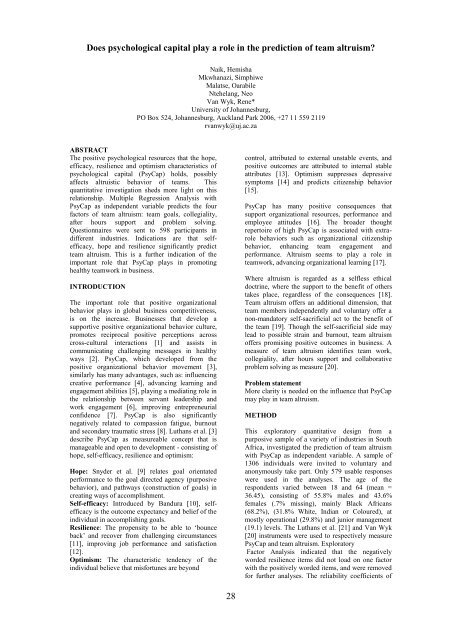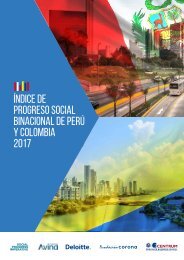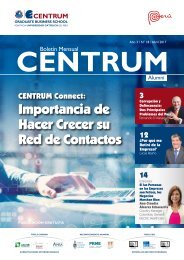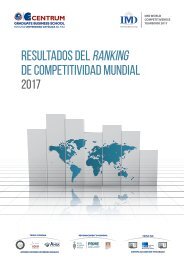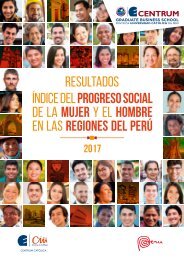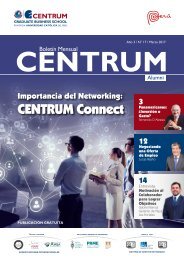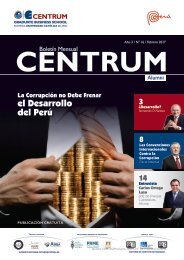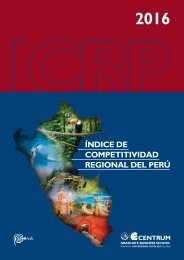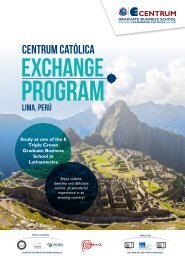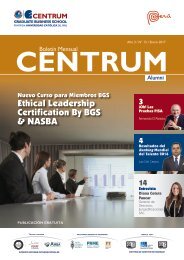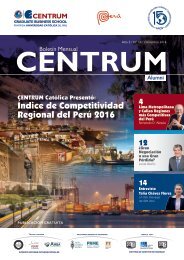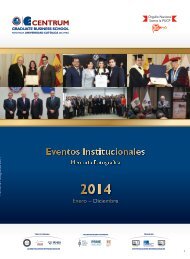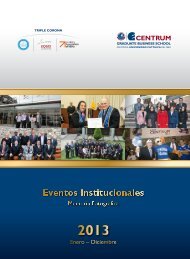Pan-Pacific Conference XXXIV. Designing New Business Models in Developing Economies
This publication represents the Proceedings of the 34th Annual Pan-Pacific Conference being held in Lima, Peru May 29-31, 2017. The Pan-Pacific Conference has served as an important forum for the exchange of ideas and information for promoting understanding and cooperation among the peoples of the world since 1984. Last year, we had a memorable conference in Miri, Malaysia, in cooperation with Curtin University Sarawak, under the theme of “Building a Smart Society through Innovation and Co-creation.” Professor Pauline Ho served as Chair of the Local Organizing Committee, with strong leadership support of Pro Vice-Chancellor Professor Jim Mienczakowski and Dean Jonathan Winterton.
This publication represents the Proceedings of the 34th Annual Pan-Pacific Conference being held in Lima, Peru May 29-31, 2017. The Pan-Pacific Conference has served as an important forum for the exchange of ideas and information for promoting understanding and cooperation among the peoples of the world since 1984. Last year, we had a memorable conference in Miri, Malaysia, in cooperation with Curtin University Sarawak, under the theme of “Building a Smart Society through Innovation and Co-creation.” Professor Pauline Ho served as Chair of the Local Organizing Committee, with strong leadership support of Pro Vice-Chancellor Professor Jim Mienczakowski and Dean Jonathan Winterton.
You also want an ePaper? Increase the reach of your titles
YUMPU automatically turns print PDFs into web optimized ePapers that Google loves.
Does psychological capital play a role <strong>in</strong> the prediction of team altruism?<br />
Naik, Hemisha<br />
Mkwhanazi, Simphiwe<br />
Malatse, Oarabile<br />
Ntehelang, Neo<br />
Van Wyk, Rene*<br />
University of Johannesburg,<br />
PO Box 524, Johannesburg, Auckland Park 2006, +27 11 559 2119<br />
rvanwyk@uj.ac.za<br />
ABSTRACT<br />
The positive psychological resources that the hope,<br />
efficacy, resilience and optimism characteristics of<br />
psychological capital (PsyCap) holds, possibly<br />
affects altruistic behavior of teams. This<br />
quantitative <strong>in</strong>vestigation sheds more light on this<br />
relationship. Multiple Regression Analysis with<br />
PsyCap as <strong>in</strong>dependent variable predicts the four<br />
factors of team altruism: team goals, collegiality,<br />
after hours support and problem solv<strong>in</strong>g.<br />
Questionnaires were sent to 598 participants <strong>in</strong><br />
different <strong>in</strong>dustries. Indications are that selfefficacy,<br />
hope and resilience significantly predict<br />
team altruism. This is a further <strong>in</strong>dication of the<br />
important role that PsyCap plays <strong>in</strong> promot<strong>in</strong>g<br />
healthy teamwork <strong>in</strong> bus<strong>in</strong>ess.<br />
INTRODUCTION<br />
The important role that positive organizational<br />
behavior plays <strong>in</strong> global bus<strong>in</strong>ess competitiveness,<br />
is on the <strong>in</strong>crease. <strong>Bus<strong>in</strong>ess</strong>es that develop a<br />
supportive positive organizational behavior culture,<br />
promotes reciprocal positive perceptions across<br />
cross-cultural <strong>in</strong>teractions [1] and assists <strong>in</strong><br />
communicat<strong>in</strong>g challeng<strong>in</strong>g messages <strong>in</strong> healthy<br />
ways [2]. PsyCap, which developed from the<br />
positive organizational behavior movement [3],<br />
similarly has many advantages, such as: <strong>in</strong>fluenc<strong>in</strong>g<br />
creative performance [4], advanc<strong>in</strong>g learn<strong>in</strong>g and<br />
engagement abilities [5], play<strong>in</strong>g a mediat<strong>in</strong>g role <strong>in</strong><br />
the relationship between servant leadership and<br />
work engagement [6], improv<strong>in</strong>g entrepreneurial<br />
confidence [7]. PsyCap is also significantly<br />
negatively related to compassion fatigue, burnout<br />
and secondary traumatic stress [8]. Luthans et al. [3]<br />
describe PsyCap as measureable concept that is<br />
manageable and open to development - consist<strong>in</strong>g of<br />
hope, self-efficacy, resilience and optimism:<br />
Hope: Snyder et al. [9] relates goal orientated<br />
performance to the goal directed agency (purposive<br />
behavior), and pathways (construction of goals) <strong>in</strong><br />
creat<strong>in</strong>g ways of accomplishment.<br />
Self-efficacy: Introduced by Bandura [10], selfefficacy<br />
is the outcome expectancy and belief of the<br />
<strong>in</strong>dividual <strong>in</strong> accomplish<strong>in</strong>g goals.<br />
Resilience: The propensity to be able to ‘bounce<br />
back’ and recover from challeng<strong>in</strong>g circumstances<br />
[11], improv<strong>in</strong>g job performance and satisfaction<br />
[12].<br />
Optimism: The characteristic tendency of the<br />
<strong>in</strong>dividual believe that misfortunes are beyond<br />
control, attributed to external unstable events, and<br />
positive outcomes are attributed to <strong>in</strong>ternal stable<br />
attributes [13]. Optimism suppresses depressive<br />
symptoms [14] and predicts citizenship behavior<br />
[15].<br />
PsyCap has many positive consequences that<br />
support organizational resources, performance and<br />
employee attitudes [16]. The broader thought<br />
repertoire of high PsyCap is associated with extrarole<br />
behaviors such as organizational citizenship<br />
behavior, enhanc<strong>in</strong>g team engagement and<br />
performance. Altruism seems to play a role <strong>in</strong><br />
teamwork, advanc<strong>in</strong>g organizational learn<strong>in</strong>g [17].<br />
Where altruism is regarded as a selfless ethical<br />
doctr<strong>in</strong>e, where the support to the benefit of others<br />
takes place, regardless of the consequences [18].<br />
Team altruism offers an additional dimension, that<br />
team members <strong>in</strong>dependently and voluntary offer a<br />
non-mandatory self-sacrificial act to the benefit of<br />
the team [19]. Though the self-sacrificial side may<br />
lead to possible stra<strong>in</strong> and burnout, team altruism<br />
offers promis<strong>in</strong>g positive outcomes <strong>in</strong> bus<strong>in</strong>ess. A<br />
measure of team altruism identifies team work,<br />
collegiality, after hours support and collaborative<br />
problem solv<strong>in</strong>g as measure [20].<br />
Problem statement<br />
More clarity is needed on the <strong>in</strong>fluence that PsyCap<br />
may play <strong>in</strong> team altruism.<br />
METHOD<br />
This exploratory quantitative design from a<br />
purposive sample of a variety of <strong>in</strong>dustries <strong>in</strong> South<br />
Africa, <strong>in</strong>vestigated the prediction of team altruism<br />
with PsyCap as <strong>in</strong>dependent variable. A sample of<br />
1306 <strong>in</strong>dividuals were <strong>in</strong>vited to voluntary and<br />
anonymously take part. Only 579 usable responses<br />
were used <strong>in</strong> the analyses. The age of the<br />
respondents varied between 18 and 64 (mean =<br />
36.45), consist<strong>in</strong>g of 55.8% males and 43.6%<br />
females (.7% miss<strong>in</strong>g), ma<strong>in</strong>ly Black Africans<br />
(68.2%), (31.8% White, Indian or Coloured), at<br />
mostly operational (29.8%) and junior management<br />
(19.1) levels. The Luthans et al. [21] and Van Wyk<br />
[20] <strong>in</strong>struments were used to respectively measure<br />
PsyCap and team altruism. Exploratory<br />
Factor Analysis <strong>in</strong>dicated that the negatively<br />
worded resilience items did not load on one factor<br />
with the positively worded items, and were removed<br />
for further analyses. The reliability coefficients of<br />
28


